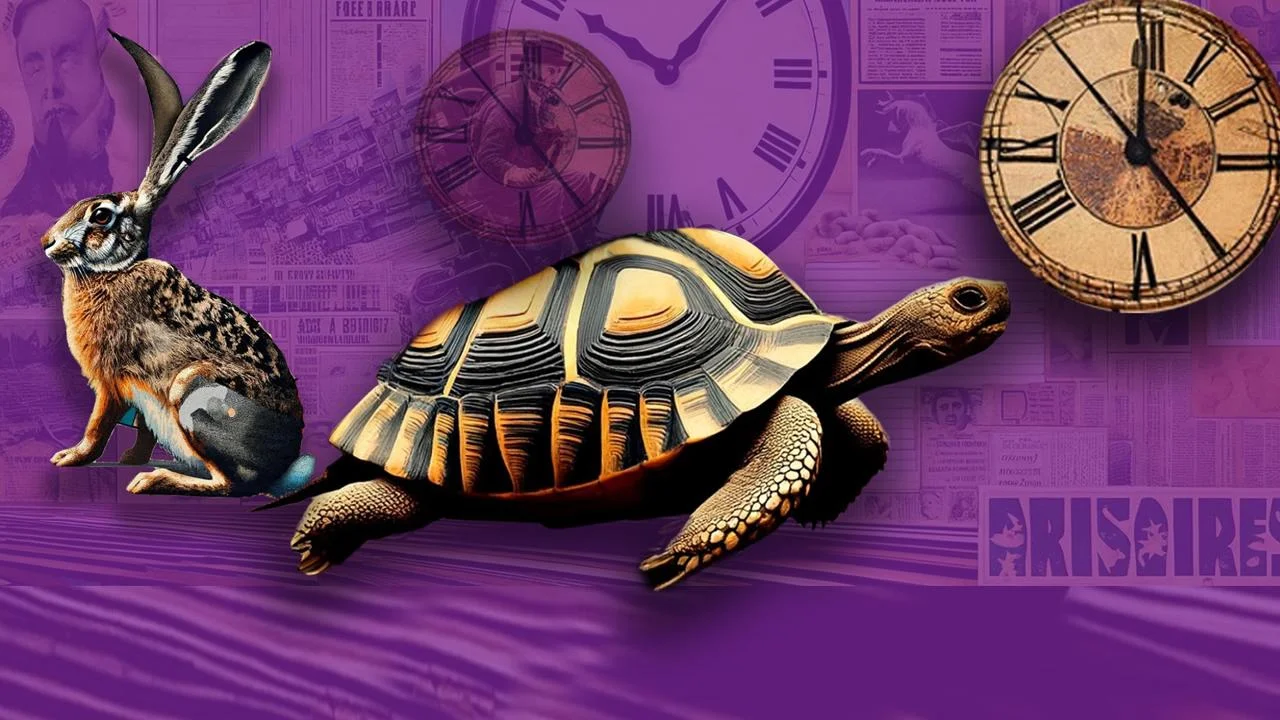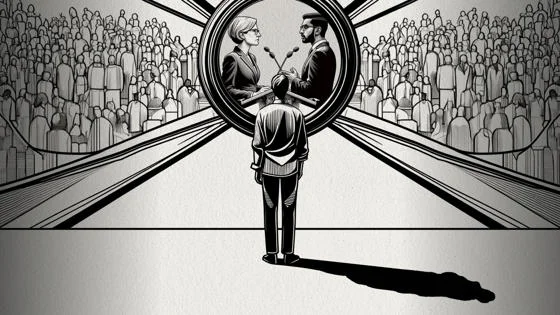How ideas of the future can help us find time for democracy

Contents
For many people, today’s world seems to be defined by ‘‘permacrisis’’. Rising inequalities, climate change, geopolitical conflict, AI – whatever the cause, there is a sense of constant emergency, a feeling that time is slipping through our fingers.
In a recent Research Showcase talk, Jonathan White, Professor of Politics in the European Institute at LSE, proposes that how we envision the future is key to how we envisage politics. His new book, In the Long Run: the future as a political idea, travels from the 18th century into the present to show ‘‘how ideas of the future are used and abused in politics, and what implications that may have for democracy’’.
The tortoise versus the hare
Professor White’s book argues that ‘‘questions of how much time we have are ones that run through much politics and have political and democratic implications’’. It is no coincidence, then, that the cover of In the Long Run features a tortoise: ‘‘when we think of a tortoise, it’s got a long cultural association with ideas of time’’, he says.
Take the Ancient Greek fable about the hare and tortoise. In that tale, the slow and steady tortoise ultimately wins the race against the hasty hare. For Professor White, the tortoise stands for the idea that ‘‘we have plenty of time. Time for deliberation, time for perseverance … the tortoise is emblematic of a certain way of approaching time with an accent on its plenitude.’’
We live in 'an age of temporal claustrophobia’'... defined by ‘'a sense of running out of time'
Speaking in front of the Fabian Window in LSE’s Shaw Library, Professor White points out that the Fabians also adopted the tortoise as their emblem. If the 18th century emphasised the immediacy of the revolutionary moment, the 19th and 20th centuries instead focused on ‘‘the indefinite future’’. For gradualist socialists like the Fabians, this meant playing the long game of political struggle, despite the risk that ‘‘working in the long run is something that can temper any radical politics’’.
Professor White argues that this question of time is very much a live question. Yet, rather than focusing on the revolutionary moment or an indefinite future, today we live in ‘‘an age of temporal claustrophobia’’, he observes, defined by ‘‘a sense of running out of time’’. Every moment becomes ‘‘if not the last, then of decisive significance, whether that’s to do with climate change, whether that’s to do with escalating economic inequalities, or whether it’s to do with geopolitics’’. For Professor White, this has profound implications for how we think about politics and democracy.
The future as political
Of course, Professor White acknowledges, ‘‘the future’’ might not seem immediately political. In our own lives, we may think about the future in terms of personal matters like ‘‘finding a job, finding a partner, concerns of illness and mortality, and so on’’. If we equate the future with our individual hopes and prospects, it might seem a step removed from politics.
Of course, Professor White acknowledges, ‘‘the future’’ might not seem immediately political. In our own lives, we may think about the future in terms of personal matters like ‘‘finding a job, finding a partner, concerns of illness and mortality, and so on’’. If we equate the future with our individual hopes and prospects, it might seem a step removed from politics.
What interests Professor White is how we consider the future as groups rather than individuals, since ‘‘ideas of the future are politically important for emerging collective forms of doing politics’’. Political movements and parties form shared identities partly through collective ideas of the future that also shed light on the present: ‘‘they offer a point of contrast and a perspective from which to think about structural change and not just change of individuals.’’
Ideas of the future also enable groups to put faith and energy into long-term planning and action: ‘‘it’s worth also emphasising ideas of the future as a source of commitment, as ways of thinking about persevering with projects that take time to realise, things that cannot be achieved overnight.’’
Not only is the future political, then, but notions of the future are particularly significant for representative democracy. There is always a sense of ‘‘loss’’ built into representative democracy as some voters will have to accept election results that they may strongly disagree with. But however much we might despair about an individual result, representative democracy depends on the belief ‘‘that the next time can be a correction to the failings of this time … there is some notion of a future in which contestation can continue’’, explains Professor White.
Things become emergencies when you feel powerless to address them.
Time running out
Today, though, ‘‘there is a sense in which the present is exactly a moment in which some of these ideas break down’’, states Professor White. He suggests that we are starting to see a loss of confidence in the future as a resource: ‘‘there is a sense of irreversible change, a sense of things coming to some sort of conclusion’’. In such a climate, political contests start to be treated as though they might be the last – Professor White gives the example of Donald Trump describing the upcoming US presidential election as ‘‘the final battle’’.
Professor White identifies a general sense of emergency that pervades contemporary politics. We might not agree on precisely what the emergency is – for some, it might be climate change or economic inequality, for others, geopolitics or AI. Nonetheless, across the political spectrum, there is a belief that ‘‘time is running out’’, that we can no longer depend on the future as a place where we have time to correct the problems of the present.
This sense of emergency partly emerges from the material challenges being faced by societies around the world, explains Professor White. But he also argues that ‘‘things become emergencies when you feel powerless to address them’’. This sense of helplessness can certainly exist among elected politicians and officials in governing circles, but Professor White believes it is strongest among those without access to these corridors of power.
This emergency outlook has serious consequences for electoral politics. For some, the sense of time running out might be attractive because it demands immediate political action. But it is also problematic, argues Professor White, because ‘‘politics, when you have a sense of no time, often loses the sense of ideas’’. While today’s temporal claustrophobia may make it seem like there is no time for ‘‘lofty ideals’’, in actual fact, Professor White explains, ‘‘radical politics requires structural change, and that requires a sense of a longer-term programme … a sense of a longer future’’.
Finding time for democracy
Professor White’s book concludes on this challenge: ‘‘to think about what it might mean to find time for democracy under these conditions’’.
If politics has become too short-termist, Professor White believes this is due to ‘the weakening of the organisations that have, over modern politics, been the best source of reassurance and confidence about the future’’. Institutions like political parties and political movements ‘‘are meant to embody a long-term cause, to give the individual reason to believe that they are contributing to something that can outlast them’’. When those organisations weaken, we see a politics of emergency and short-termism come to the fore.
For Professor White, the solution is not simply encouraging people to think more about the future, about the long term. Rather, ‘‘it’s got to be about countering that sense of powerlessness that turns problems into emergencies, that makes people want a resolution in the now for things that otherwise they might be willing to see as the foundation for a continuing political project.’’
This LSE Research Showcase was written up by Rosemary Deller, Knowledge Exchange Support Manager at LSE.
Download a PDF version of this article
2024 is a year of elections. What happens when the world goes to the polls?
- Read more articles from this global politics special edition of the LSE Research for the World online magazine.
- Explore our dedicated hub showcasing LSE research and social science commentary on key debates and emerging themes in global politics.
- Join us for the LSE Festival: Power and Politics, a week of events from 10 to 15 June 2024.




